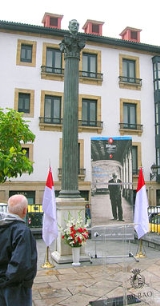
, Biscay
, Basque Country
, Spain
– 31 December 1936, Salamanca
, Salamanca, Castile and León
, Spain) was a Spanish essay
ist, novel
ist, poet
, playwright
and philosopher.
Miguel de Unamuno was born in Bilbao, a port city of Spain, the son of Félix de Unamuno and Salomé Jugo. As a young man, he was interested in the Basque language
, and competed for a teaching position in the Instituto de Bilbao, against Sabino Arana
. The contest was finally won by the Basque scholar Resurrección María de Azkue
.
Unamuno worked in all major genres: the essay, the novel, poetry and theatre, and, as a modernist
, contributed greatly to dissolving the boundaries between genres.
The devil is an angel too.![]()
There are pretenses which are very sincere, and marriage is their school.![]()
Use harms and even destroys beauty. The noblest function of an object is to be contemplated.![]()
Whenever a man talks he lies, and so far as he talks to himself — that is to say, so far as he thinks, knowing that he thinks — he lies to himself. The only truth in human life is that which is physiological. Speech — this thing that they call a social product — was made for lying. ![]()
We men do nothing but lie and make ourselves important. Speech was invented for the purpose of magnifying all of our sensations and impressions — perhaps so that we could believe in them.![]()
Isolation is the worst possible counselor.![]()
Every peasant has a lawyer inside of him, just as every lawyer, no matter how urbane he may be, carries a peasant within himself.![]()
It is sad not to be loved, but it is much sadder not to be able to love.![]()
These terrible sociologists, who are the astrologers and alchemists of our twentieth century.![]()

